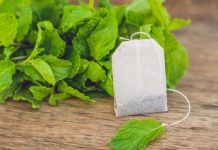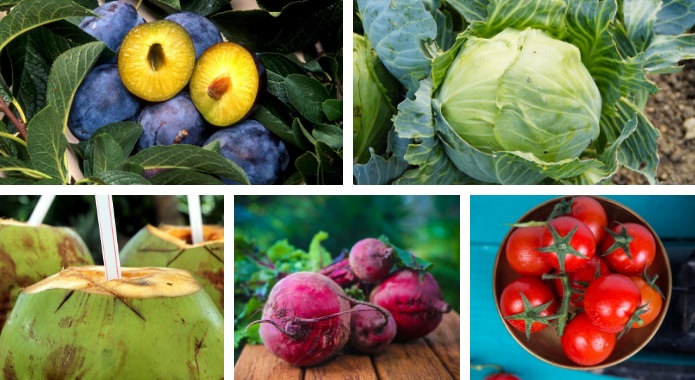
REMEMBER: These Are TOP 10 Natural Laxatives That Will Really Help! Pay SPECIAL Attention to Laxative #6! These Tips Helped Over 247,000 Readers of DIETBLY! AWESOME Photos Inside!
From time to time, we all end up feeling a bit constipated. It can happen for a vast array of reasons that many of us have no idea about. Fortunately, there are countless ways to address this nasty problem.
In this post, you will find these natural laxatives:
- Apples
- Legumes, Beans & High Fiber Food
- Beets
- Drink Enough Water
- Prunes
- Flax Seeds & Various Nuts
- Tomatoes
- Coconut Water
- Cabbage
- Aloe Vera
In general, people tend to go for pills and chemical stuff to restore their bowel movement. However, they often do not realize that there are healthier methods to achieve that.
Below are ten natural laxatives you can use to fight constipation. Best of all, these foods have many other health benefits which mean you can work them into your daily diet for an overall improvement of your well-being.
Laxative #1 – Apples
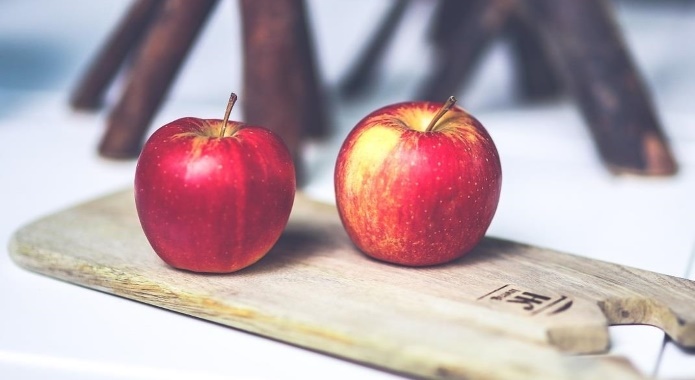
Everyone knows an apple a day keeps the doctor away. However, only a few people understand how helpful this popular fruit can be in keeping you regular as well.
Two primary forms work wonders for fighting constipation:
- Raw fruit – Organic raw apples are high in vitamin C as well as the kind of sugar our bodies need to get going in the morning. They are also rich in digestive fiber called pectins, substances that stimulate your bowels.
- Fermented juice – Apple cider vinegar is also an excellent option for curing constipation and getting your digestive system on track. Except for pectins and probiotics, your body will get malic acid for easing stubborn stool.
If you decide to buy this sour liquid, then you need to choose a brand that is made from organic apples, and that has not been filtered. The best one on the market right now is called Bragg that includes even “the mother“.
The organic unfiltered apple cider vinegar has many other health benefits for your body you should know about.
My advice:
Add an apple to your breakfast and pour one tablespoon of its vinegar to your next morning glass of water. Trust me that your intestines will thank you!
Related research study:
“Chronic constipation is a very common disease in children. Successful treatment of constipation can be achieved not only with medication but also with lifestyle changes, including a proper diet. Diets including fruits, fluids, and probiotics are good for constipation.”
– Bae, S.H. Diets for Constipation. 2014. Pediatric Gastroenterology, Hepatology & Nutrition. 17(4): p. 203–208.
Laxative #2 – Legumes, Beans & High Fiber Food
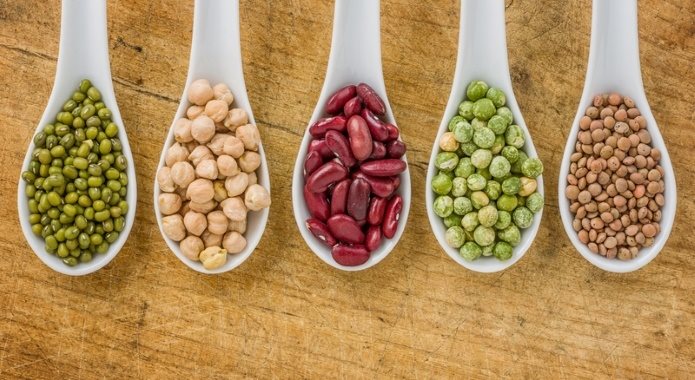
A healthy diet that will lead to good bowel movements should include around 39.5 grams of dietary fiber for an adult person. Sadly, average American diet offers just a mere 19.5 grams.
Therefore you should add these to your diet:
– White Anasazi beans (24g of fiber per 100g)
– Dark Adzuki beans (16.8g)
– White garbanzo beans (12.5g)
– Lentils (7.9g)
– Peas (5.7g)
Foods that are high in fiber like legumes and beans are so easy to add to our diet that it simply doesn’t make sense not to. In general, this category of food is also quite low in cholesterol, meaning you can consume a generous amount without doing damage to your overall health.
Beans, for example, can be used to make countless dips and sauces. They can also be easily augmented with spices to create unique and delicious flavors. By pairing legumes with whole grain, your body gets a complete protein with every bite.
Related research study:
“Dietary fiber intake can obviously increase stool frequency in patients with constipation. It does not obviously improve stool consistency, treatment success, laxative use and painful defecation.”
– Yang, J., et al. Effect of dietary fiber on constipation: a meta analysis. 2012. World Journal of Gastroenterology. 18(48): p. 7378-83.
Related research study:
“Dietary fiber intake provides many health benefits. However, average fiber intakes for US children and adults are less than half of the recommended levels. Individuals with high intakes of dietary fiber appear to be at significantly lower risk for developing coronary heart disease, stroke, hypertension, diabetes, obesity, and certain gastrointestinal diseases. Increasing fiber intake lowers blood pressure and serum cholesterol levels.”
– Anderson, J.W., et al. Health benefits of dietary fiber. 2009. Nutrition Reviews. 67(4): p. 188-205.
Laxative #3 – Beets
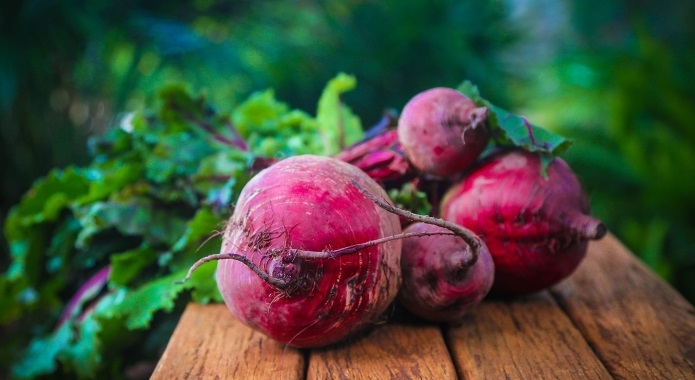
Beets don’t get used enough in our diets and our meals. It is sad considering how good they are for a human body. Except keeping you regular, these vegetables are great for your skin and will assist with weight loss too.
What is more, beets are high in complex carbohydrates. If you will eat these in the morning or for the lunch, you can take advantage of their high energy content.
Thanks to the complex carbs, the energy will be released gradually and not at once as it is in the case of sweets made out of refined sugar.
Laxative #4 – Drink Enough Water

About 80% of human body is made up of water, and we need its constant supply in order to survive. However, most people just do not drink enough water throughout the day. This is a shame considering how important this liquid is to our overall health and how easy it is to get in America.
Among other things, it assists with constipation in two ways:
- It helps to soften up your stool
- It also cures dehydration that can be the main reason you’re not regular
If you’re constipated, one of the first things you should do is increase your consumption of water to 13 glasses per day for men and 9 for women.
Related research study:
“While sulphate in drinking water does not appear to have a significant laxative effect, fluid intake and magnesium sulphate-rich mineral waters were shown to improve constipation in healthy infants. In conclusion, fluid loss and fluid restriction and thus de-or hypohydration increase constipation. It is thus important to maintain euhydration as a prevention of constipation.”
– Arnaud, M.J. Mild dehydration: a risk factor of constipation? 2003. European Journal of Clinical Nutrition. 57(Suppl 2): p. S88-95.
Laxative #5 – Prunes
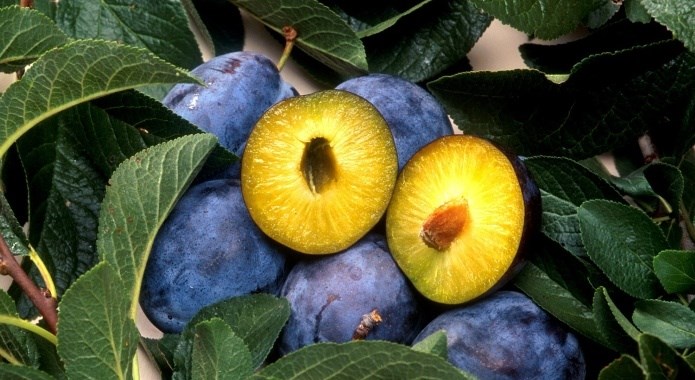
Prunes (or dried plums) are well known for their effects as a natural laxative. But they’ll do far more than help you keep regular! This food is also rich in vitamin A and potassium.
According to one study, the mild laxative action could be explained by their high sorbitol contents, as well as phenolic compounds (especially neochlorogenic and chlorogenic acids).
The dried plums have been shown to lower bad cholesterol and reduce the risk of both heart disease and cancer as well.
Related research study:
“Dried prunes contain approximately 6.1 g of dietary fiber per 100 g, while prune juice is devoid of fiber due to filtration before bottling. The laxative action of both prune and prune juice could be explained by their high sorbitol content (14.7 and 6.1 g/100 g, respectively).”
– Stacewicz-Sapuntzakis, M., et al. Chemical composition and potential health effects of prunes: a functional food? 2001. Critical Rev Food Sci Nutr. 41(4): p. 251-286.
Laxative #6 – Flax Seeds & Various Nuts
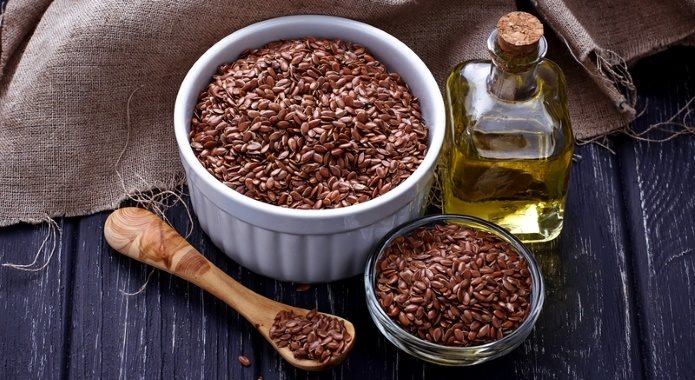
Flax seeds are great for helping cure constipation because these come packed with a lot of natural fiber. When you drink enough water after you ingest grounded flax seeds, these will absorb liquids in your stomach and will eventually grow in size.
By doing so, this mass of engorged flax seeds will force anything in its path out of your bowels. This food is also rich in all-important omega-3 fatty acids.
Other seeds and nuts can go a long way in helping you fight constipation and stay regular. For example, both walnuts and cashews have a laxative effect. But these are also an excellent source of healthy fats and energy.
Related research study:
“Antioxidant vitamins and lipid hydroperoxides in plasma were not significantly affected by flaxseed consumption. Bowel movements per week increased by 30% while flaxseed was consumed (P < 0.05). We conclude that traditional flaxseed has modest beneficial effects on several indexes of nutritional status without compromising antioxidant status.”
– Cunnane, S.C., et al. Nutritional attributes of traditional flaxseed in healthy young adults. 1995. The American Journal of Clinical Nutrition. 61(1): p. 62-68.
Laxative #7 – Tomatoes
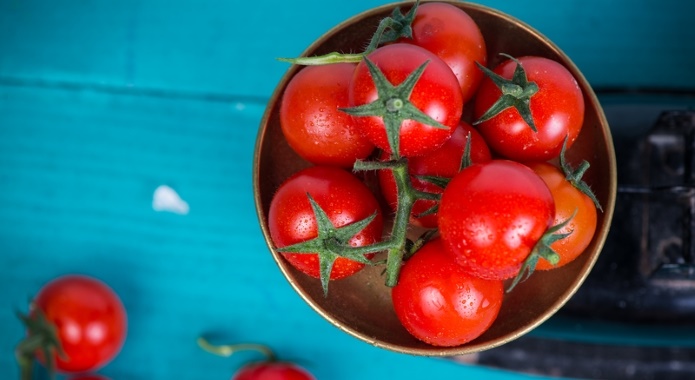
Tomatoes are a staple of many people’s diets, but you can always use more. This food is actually a fruit and comes packed with vitamins K, C, and A — all of which are essential to your body.
But these can also go a long way in supplying you with the fiber you need to stay regular.
Ripe tomatoes are rich in riboflavin, a potent antioxidant substance that is responsible for its red color. Furthermore, these vegetables are rich in other antioxidants, especially lycopene, that will help your body fight potential dangers like prostate and colon cancer.
Just choose the locally grown, organic brands for maximum health benefits.
Related research study:
“The antioxidant activity of lycopene as well as several other carotenoids and their abundance in tomatoes makes these foods rich sources of antioxidant activity. The provitamin A activity of beta- and gamma-carotene, their modest levels in tomato products, and the high consumption of these foods results in a rich supply of vitamin A activity from tomato-based foods.”
– Beecher, G.R. Nutrient content of tomatoes and tomato products. 1998. Proceedings of the Society for Experimental Biology and Medicine. 218(2): p. 98-100.
Laxative #8 – Coconut Water
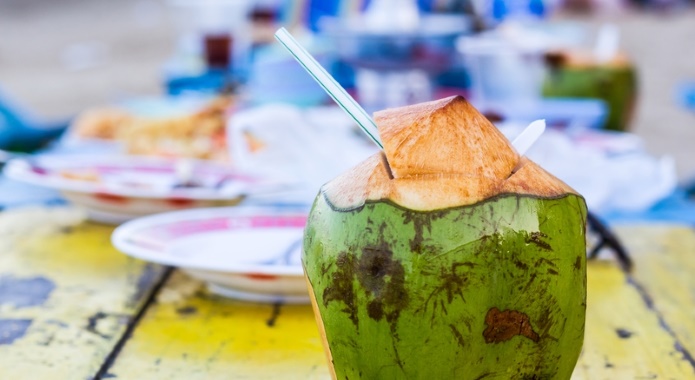
Coconut water doesn’t just taste good. It’s great for your body too! Sweet to the taste and rich in the potassium (K), it helps with clearing out your urinary tract and lowering your blood pressure.
Not only that, this excellent drink can:
– Lower your cholesterol levels
– Reduce your chance of contracting glaucoma
– Reduce fluid pressure of your eyes
Although too much of a coconut can result in loose stools you want to avoid, there’s nothing wrong with drinking it daily (in moderate amounts) over an extended period.
In case you suffer from a bowel system that won’t move, drinking coconut water can be one of the best things you can do. You need to keep in mind that we are talking about water from young, green coconuts and not the mature ones!
When making your purchase, always choose brands that are pure and not made out of concentrate.
Related research study:
“Plasma glucose concentrations were significantly higher compared with PW [plain water] ingestion when CW [coconut water] and CEB [carbohydrate-electrolyte beverage] were ingested during the rehydration period. CW was significantly sweeter, caused less nausea, fullness and no stomach upset and was also easier to consume in a larger amount compared with CEB and PW ingestion. In conclusion, ingestion of fresh young coconut water, a natural refreshing beverage, could be used for whole body rehydration after exercise.”
– Saat, M., et al. Rehydration after exercise with fresh young coconut water, carbohydrate-electrolyte beverage and plain water. 2002. Journal of Physiological Anthropology and Applied Human Science. 21(2): p. 93-104.
Laxative #9 – Cabbage
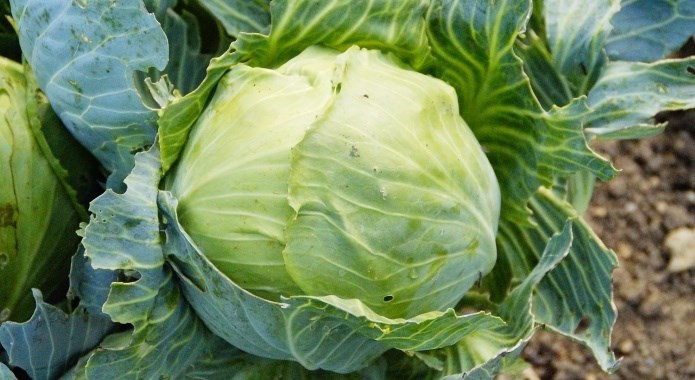
Cabbage is another example of a good solution too many of us overlook despite its affordability and beneficial properties. This vegetable will certainly help keep you regular, and people know it as a natural laxative for years.
There are two primary forms you can use:
- Fresh cabbage – This one has mild to moderate laxative effect mainly because of its fiber-rich content.
- Fermented sauerkraut – This second option has a moderate to strong laxative effect mainly because the fermentation process creates a substance called acetylcholine that promotes the digestive movement.
Furthermore, cabbage will alleviate your digestive tract of toxins as well. An excellent option for your digestive system is sauerkraut that combines the benefits of cabbage with healthy probiotics.
Related research study:
“Probiotics may improve whole gut transit time, stool frequency, and stool consistency, with subgroup analysis indicating beneficial effects of B. lactis in particular. However, caution is needed with the interpretation of these data due to their high heterogeneity and risk of bias. Adequately powered RCTs are required to better determine the species or strains, doses, and duration of use of probiotics that are most efficacious.”
– Dimidi, E., et al. The effect of probiotics on functional constipation in adults: a systematic review and meta-analysis of randomized controlled trials. 2014. American Journal of Clinical Nutrition. 100(4): p. 1075-1084.
Laxative #10 – Aloe Vera
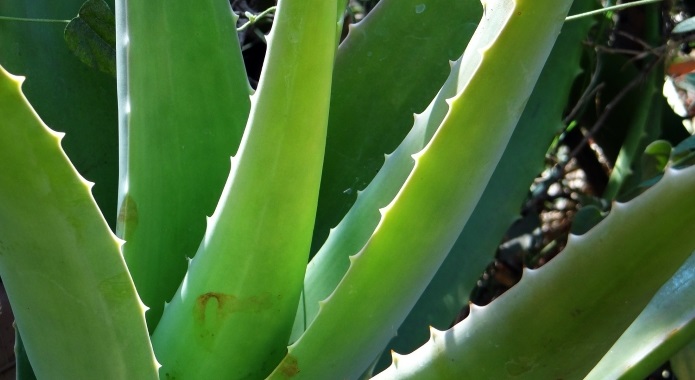
Most people are familiar with Aloe Vera plant as an amazing way of keeping their skin healthy. But did you know you can also consume it and that there are significant benefits related to doing so?
It’s true.
This plant provides your body with around 75 nutrients that include:
– 20 Minerals
– 12 Vitamins
– 18 Amino acids
– Active compounds called phytonutrients
– Various enzymes
– Lot of water
There is a special category of substances called anthraquinones. This group contains a combination of chemicals, especially a liquid aloin, that have been proven to be very potent laxatives.
There are many more health benefits of Aloe Vera, and I highly recommend you to plant your own in a pot as soon as possible.
Related research study:
“The effect of the extract compares favourably well with senokot, a standard laxative drug. These findings have therefore, lent scientific credence to the folkloric use of the herb as a laxative agent by the people of the Eastern Cape of South Africa.”
– Wintola, O.A., et al. The effect of Aloe ferox Mill. in the treatment of loperamide-induced constipation in Wistar rats. 2010. BMC Gastroenterology. 10: p. 95.
Final Verdict: Always Go for Natural Options
Click on the Image Above to Watch the Video on Great Laxative Recipe – This Will Really Help You Detox Your Colon
So I hope you like our collection of awesome and natural constipation remedies. Use these ten foods whenever you feel full to receive almost instant relief!
When choosing these fruits and vegetables, always go for locally grown products that are organic to boost your health to the maximum.
Just keep in mind:
Do not use options on this list as an emergency solution but try to add these to your typical daily diet. This way, you should always stay regular and reap countless other health benefits these foods will bring to you.




